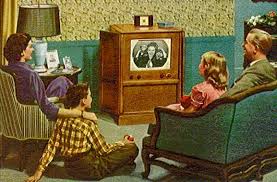 March 30, 2017 (Thursday)
March 30, 2017 (Thursday)
In the early 1950s, taking a cue from old-time radio schedules, national news programs were 15 minutes long and so were local news programs. Today, each of those shows requires 30 minutes and the news is shown before and after the national news on our local channels.

The Old Days
In the meantime, the 24-hour news channels have come into being, and we can watch them 24 hours a day if we can stay awake that long.
As you get caught up on the news, you are also exposed to the latest deals in all types of merchandise and services. Of course, that’s the business side of the entertainment and news industries.
If you watch an entertainment program 60 minutes in length, you get about 18 or 19 minutes of commercials and/or promotions of other shows. That’s up from 8 or 9 minutes in the early days of TV (the early 1950s). The percentage of time devoted to commercials, etc., has steadily increased.
What we have learned from watching recordings of movies is that without commercials we have to hit the pause button when a break is necessary or when snack time rolls around. Without knowing it, then, the commercials sometimes serve a useful purpose for the viewers.
With the advent of the mute button, commercial producers have developed ways of making the commercials visually and audibly more entertaining, enticing the viewer to keep watching during the break. This has probably been pretty successful.
The coming of the recorders has altered the scenario for some, as they record the program and watch it later, fast forwarding through the commercial breaks.
Some hardy souls have given up on TV, or never took up the habit, and have found reading to be exciting, also handwork and crafts, as well as needful projects around the house, and just talking with each other to be worthy uses of time with no worries whatsoever about TV commercials, promotion, news, or entertainment. Just not interested. Upon analysis, much of what takes up time watching TV has proved to be valueless and a waste.
Television in all its forms, old and new, will be around in one way or another for the foreseeable future, because it makes a lot of money for a lot of people, and that’s the way we do things in the U.S.A.
